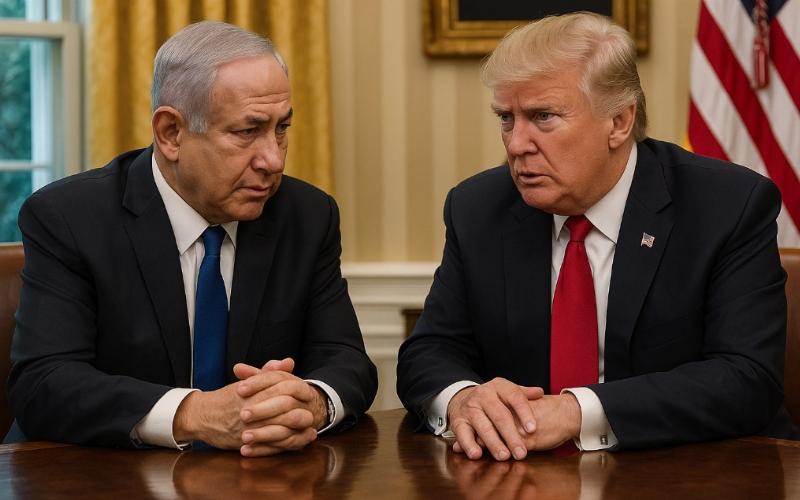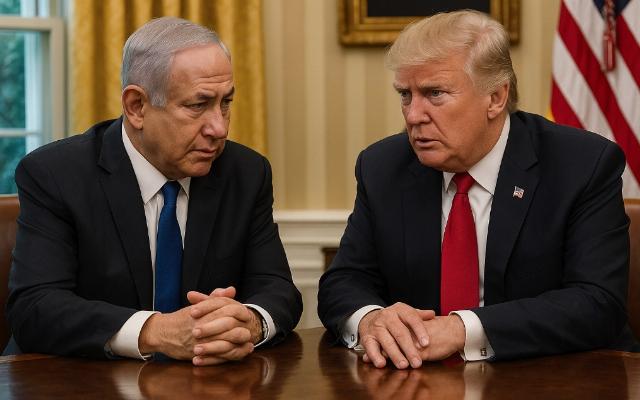


The New York Times has written a savage attack against Israel’s Prime Minister, Benjamin Netanyahu, claiming in the title that he “Prolonged the War In Gaza to Stay in Power.” It’s a long essay, but the gist is that, in April 2024, at the end of what turned out to be Biden’s last year office, Bibi had a six-week ceasefire just waiting to be signed, which would have released a few more hostages while saving Gazan lives and getting Saudi Arabia to sign the Abraham Accords. But Bibi, to save his political skin, continued the war.
Let’s say that I’m dubious. The essay was clearly written from the point of view of Bibi’s political rivals. I’m not going to deconstruct here. Instead, I want to offer a very serious countervailing essay that Avi Abelow published just a few days before the NY Times’ smear job.

Image created using ChatGPT.
In his essay, entitled “The Most Explosive Story You Haven’t Heard: Netanyahu, Trump, and the Fight Behind the Front Lines,” Abelow details the Deep State war being fought against Bibi: a war so vicious that the people behind it are willing to sacrifice Israel’s security to win. Fortunately, Bibi has Trump at his back.
Some of the essay is truly “inside Israel” politics, but I’ll summarize the points that struck me with such force.
It’s no secret that Bibi and Trump have been working closely together since Trump came to office. I happen to think that Trump encouraged Bibi to accept a “meh” ceasefire in early January so that Bibi could hold out until Biden left the White House and Trump came on board.
According to Abelow, there’s more to last week’s meetings between Bibi and Trump than just dealing with external threats to Israel from America’s and Israel’s shared enemy, Iran:
These meetings aren’t just about military coordination or diplomatic pressure. It reflects a shared understanding: no external victory is possible without also confronting internal dysfunction.
Because Israel is involved in two struggles – one war against an Islamonaz*i enemy, with the focus in Gaza, and one internal sabotage at home.
What’s so fascinating about the threats Abelow then describes is that they perfectly mirror what George W. Bush was facing during the Iraq and Afghanistan Wars, when leftist forces inside and outside of the government relentlessly undermined the war efforts. The only difference is that the Israelis’ war isn’t about nation-building in a Muslim country but about surviving in their own country:
Instead of rallying around the nation’s survival, these institutions [senior legal officials, military officers, and media figures] launched an internal campaign of psychological warfare. They weaponized the hostage crisis to drain public morale, stir fear, and pressure the government into premature concessions. Media allies and expert pundits relentlessly pushed defeatist messaging: “Soldiers are dying for nothing,” “There’s no military solution,” “Bring the hostages home — even at any cost.” The objective wasn’t humanitarian — it was political: to force Netanyahu into a ceasefire that would halt the war and collapse his government, not through elections, but by breaking public will.
Because of these internal pressures, Bibi was forced repeatedly to engage in short-term ceasefires. By doing so, he got some hostages home and kept robbing momentum from the burgeoning anti-war movement. This tactic worked, writes Abelow, turning the anti-war movement into a “fringe cause.”
However, the fight within the Israeli government goes on, and, while Israelis dislike the term, a “deep state” is at work:
On the surface, we’re battling Hamas. But behind the scenes, an unelected layer of legal, military, and bureaucratic elites is obstructing government policy, paralyzing decision-making, and undermining our war effort. Many Israelis instinctively shy away from language like “deep state.” But what else do you call it when a government decision is blocked — not by voters but by officials who were never elected?
If you’re like me, you’re getting total Iraq and Afghanistan War flashbacks. This is how the leftist Deep State operates when a conservative is in power and may achieve lasting peace with an enemy that, like the left, opposes Western and Biblical culture.
Israel even has its own Abu Ghraib cognate. As you may recall, photos leaked showing American troops humiliating Iraqi prisoners in Abu Ghraib, something that the left used to great effect in the anti-war movement.
In Israel, writes Abelow, a video leaked showing alleged abuse in Sde Teiman prison. Although the video was proven to have been doctored, it traveled around the world, right into the hands of UN Special Rapporteur Francesca Albanese, the hysterical antisemite whom the State Department, under the magnificent Marco Rubio, just sanctioned.
The Biden administration worked hand-in-hand with the most radical anti-Bibi forces. So, while our ally Israel was fighting an existential war against an enemy that is also America’s enemy, the Biden administration was paying taxpayer dollars to destabilize the Israeli government. As the young would say, I can’t even...
And of course, Bibi faces an activist, unelected judiciary that is working hard to destroy him. In Bibi’s case, though, it’s worse than it is for Trump, because Trump’s first term means that the Supreme Court hasn’t been handed over entirely to judges who place politics ahead of the law.
Abelow explains that Bibi and Trump are in this one together because they both understand the stakes:
This is why the Netanyahu–Trump alignment matters. Not because of personalities or partisan politics—but because both leaders now face the same challenge: unelected deep state institutions that have drifted from their mandates, acting as power centers unto themselves.
This isn’t about Left or Right—it’s about democratic accountability. When unelected legal officials override government decisions on life-and-death military policy, that’s a crisis. When US-funded NGOs run political pressure campaigns to topple our government, especially during wartime, that’s a threat. When top military brass ignore binding cabinet decisions, that’s not “independence”—it’s insubordination.
I’ve just skimmed the essay’s surface and left out quotations from Israeli political and military actors, so I recommend that you read the whole thing.
From an American perspective, the takeaway is that Bibi and Trump, two of the most brilliant men in world politics, and two men who are fiercely loyal to their respective countries, are working together because two geniuses trying to save Western civilization are better than one.
